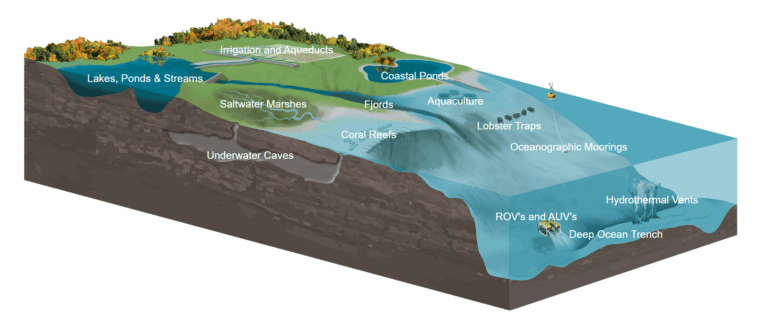Coastal research depends on good data. Whether you’re studying tidal dynamics, estuarine health, or nearshore ecosystems, understanding how water moves is essential. But collecting accurate water current data in these environments is anything but simple. Strong currents, shifting tides, and dynamic coastal conditions can make it difficult to capture reliable, long-term measurements.
The Challenge of Fieldwork
Fieldwork along coasts and estuaries pushes instruments to their limits. Equipment is exposed to waves, saltwater corrosion, and harsh weather. Deployments often need to span weeks or months, meaning instruments must endure changing conditions without constant maintenance.
When sensors fail or data sets come back incomplete, researchers face real consequences:
- Missed tidal cycles and data gaps
- Delayed analysis or publications
- Time lost redeploying or troubleshooting equipment
For researchers, the cost of unreliable measurements isn’t just frustration — it can set entire projects back.
Simplifying Fieldwork with the Right Tools
This is where the right instruments make all the difference. Lowell Instruments are designed specifically for long-term, reliable performance in challenging environments.
- Rugged and field-ready: Built to withstand waves, salinity, and tough deployment conditions.
- Easy to deploy and maintain: Minimise time in the field and maximise time spent analysing results.
- Accurate and dependable: Capture continuous, high-quality data, even in dynamic tidal environments.
For coastal researchers, that means more reliable datasets and fewer headaches in the field.
Applications in Action
Lowell’s instruments are already trusted by research teams worldwide in projects such as:
- Estuary monitoring: Measuring how currents influence sediment movement and ecosystem health.
- Tidal energy studies: Collecting precise data to support renewable energy projects.
- Coastal restoration: Tracking water flow to inform habitat rehabilitation and shoreline management.
- Nearshore ecology projects: Understanding how current patterns shape marine life distribution.

Why This Matters for Researchers
Every hour saved in the field means more time spent doing what matters most — analysing results, drawing conclusions, and publishing with confidence. With reliable water current data, researchers can:
- Strengthen the credibility of their findings
- Deliver more robust publications
- Build confidence with stakeholders and funding bodies
In short: better data means better science.
If you’re looking to bring accurate, long-term water current measurement into your coastal research, Lowell Instruments offer a proven range of tools designed for challenging environments. To discuss the best fit for your project, you can also talk to one of our experts about your research requirements.

